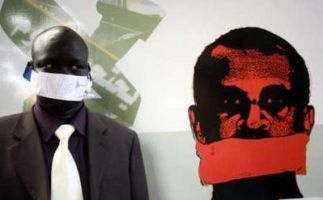Sudanese court acquits journalist of charges over military photographs
December 10, 2014 (KHARTOUM) – A court in Sudan’s West Kordofan state has exonerated journalist Aisha el-Samani of charges relating to entering and photographing military premises.

Al-Samani was then taken to al-Nuhood police station where she was interrogated for one hour before being released on bail.
The judge on Wednesday said that al-Nuhood prison is considered a civil institution and nothing prevents photographing it.
If convicted, el-Samani, would have been imprisoned for a term not exceeding one year and/ or be fined.
Sudanese journalists and newspapers work under tight daily censorship controls exercised by the National Intelligence and Security Services (NISS).
Journalists say that confiscation and suspension of newspapers is a commonly used practice by the local authorities to overburden the newspapers with financial losses alongside other non-financial pressures.
Sudan’s Journalists’ Association for Human Rights (JAHR) said that it registered similar patterns of violations against journalists’ rights, holding journalistic work leaders and NISS responsible for forcing dozens of journalists to emigrate or abandon the profession.
It pointed in a statement in the occasion of the Human Rights Day that NISS carries out 3 types of violations against journalists and media workers including daily, seasonal and permanent violations, saying this represent violation of freedom of press and speech according to national and international human rights standards.
The statement added that this year’s reports revealed several violations including the expired constitution, repressive press law, absolute power of the NISS and the press prosecution offices which contradict the law itself, pointing all these permanent legislative frameworks contravene the international standards.
(ST)
